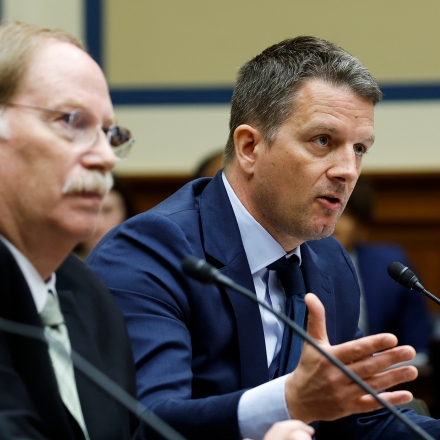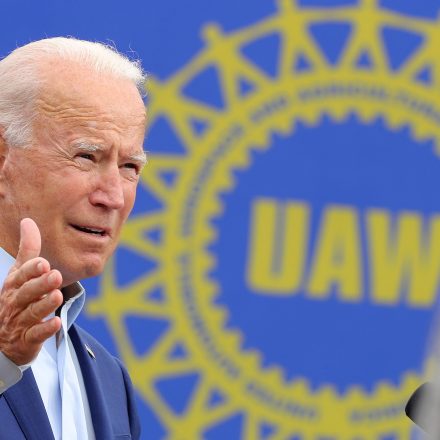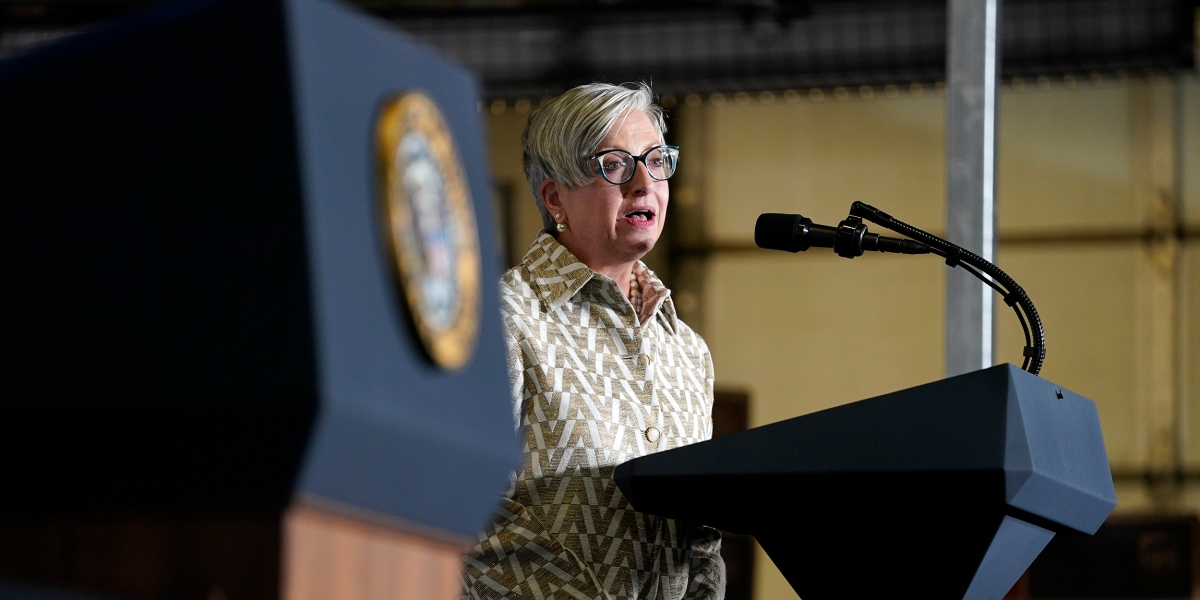The House oF Representatives is poised for a showdown over military intervention and U.S. foreign policy, unless the GOP blocks a sweeping set of amendments from a bipartisan group of lawmakers challenging the status quo.
The amendments, submitted to the National Defense Authorization Act, or NDAA, need approval from the House Rules Committee before they can be considered for a vote. The Rules Committee has 13 members, four of whom are Democrats and three of whom are Freedom Caucus Republicans, enough to approve an amendment acting in coalition.
One of the most direct challenges to the Biden administration is a bill led by Democratic Reps. Sara Jacobs and Ilhan Omar which would block the transfer of cluster munitions to Ukraine and all other countries. On Monday afternoon, Rep. Matt Gaetz, R-Fla., said he would sign on as a co-sponsor to the bill, championing it in the Rules Committee and giving it a stronger shot of making it to the floor for a vote. On Tuesday, Rep. Paulina Luna, R-Fla., co-sponsored the legislation, raising expectations among its backers that Rules Committee member Thomas Massie, R-Ky., will advocate for it to be ruled in order, which allows it a vote on the House floor.
Other amendments in search of a floor vote or inclusion in the underlying bill restrict military cooperation with a variety of governments accused of human rights abuses, order the declassification of information about past U.S. participation in coups or the operation of death squads, or shift spending from weapons systems toward social programs for troops.
This week’s NDAA fight in the Rules Committee and later on the House floor will be a fresh test for the new populist right — which has taken an isolationist turn away from the neoconservatism that previously dominated Republican orthodoxy — of whether their opposition to the global war machine is talk on a podcast or something capable of marshaling enough support to be a real threat to the military-industrial complex. Still, even with all three Freedom Caucus members on board, amendments hostile to American war policy would still likely need full Democratic support to get a floor vote, a difficult task in a divided party. Last week, 19 Democrats sent a letter to Biden objecting to the cluster munitions transfer, arguably the most significant objection from House Democrats to Biden’s Ukraine policy. But while it was a high number relative to previous efforts, 19 still represents less than one in 10 members of the House Democratic caucus.
“During this year’s NDAA process we’ve seen broad bipartisan coalitions come together around a variety of policies challenging the Executive Branch’s expansive military and surveillance overreach — from preventing the transfer of cluster bombs and demanding war powers votes for Yemen and Syria to oversight over irregular warfare authorities, to limiting government purchases of data about Americans,” said Cavan Kharrazian, foreign policy adviser at Demand Progress, a progressive policy organization. “While we’re dismayed that many good amendments will likely not get floor votes, we are encouraged about the growing cross-ideological base challenging concerning national security policies.”
In the past week, multiple U.S. allies including the United Kingdom and Spain have voiced opposition to the Biden administration’s support for sending cluster bombs to Ukraine. As The Intercept previously reported, these weapons are banned by over 100 countries and have already killed civilians when deployed by the Ukrainian military, which has obtained some cluster munitions from Turkey. Despite initial promises that only munitions with a low dud rate would be sent to Ukraine, subsequent statements suggest that some weapons being lined up for transfer could have a dud rate as high as 14.5 percent, leaving thousands of explosives primed and unexploded on battlefields across Ukraine. Russia has also used cluster munitions during its invasion — an act that former White House press secretary Jen Psaki suggested last year was a potential war crime.
Jacobs and Omar’s amendment orders that “no military assistance shall be furnished for cluster munitions, no defense export license for cluster munitions may be issued, and no cluster munitions or cluster munitions technology shall be sold or transferred.” Gaetz, in declaring his support for the amendment on his podcast “Firebrand with Matt Gaetz,” said, “We have an opportunity with bipartisanship to stand against the warmongering Bidens. These cluster bombs will not end the war in Ukraine.”
In a statement released last week, Jacobs wrote, “Our international coalition is strong because we’re united together and because we’re living up to our values — but sending cluster munitions defies these two tenets. Many of our partners don’t support this move with many having already banned cluster munitions from their stockpiles. We’ve seen Russia’s horrific use of cluster munitions in Ukraine — and we shouldn’t cede the moral high ground by criticizing their actions and then deciding to send cluster munitions ourselves.”
Reining in U.S. Funding of Human Rights Abusers
In another direct shot at U.S. war making capacity, Omar introduced legislation to repeal the Pentagon’s 127e program, which The Intercept previously exposed as a route by which the U.S. wages proxy war, sponsoring death squads or other irregular partner forces with hideous human rights records. While Omar’s legislation would ban the program, Jacobs has introduced a separate measure to curtail it by requiring the Pentagon to vet the groups it sponsors for credible allegations of human rights abuses and consider whether the alliance may damage U.S. interests.
Other efforts to amend the NDAA to rein in foreign military cooperation would curb assistance to countries accused of ongoing human rights abuses. These include a prohibition on military aid and security assistance to Azerbaijan offered by Democratic Rep. Frank Pallone of New Jersey. Rep. Adam Schiff, D-Calif., proposed a narrower measure that restricts weapons transfers in order to put pressure on Azerbaijan to end its siege of Nagorno-Karabakh. Schiff is running for Senate in California, where the state’s Armenian American population wields substantial clout.
Rep. Greg Casar, a first-term legislator who represents Austin, Texas, has quickly carved out space as a leading voice on foreign affairs; he introduced an NDAA amendment to instruct the State Department to examine and report on the democratic backsliding underway in Pakistan, as the country’s military establishment targets former Prime Minister Imran Khan.
A measure by Rep. Alexandria Ocasio-Cortez, D-N.Y., requires the Pentagon to report back on human rights abuses carried out by its allies before continuing certain military partnerships in Peru, where a left-wing populist president was recently forced out by the right-wing opposition.
Ocasio-Cortez also introduced a measure requiring the CIA, Pentagon, and State Department to declassify information related to the U.S. government’s role in the Chilean coup that brought dictator Augusto Pinochet to power.
She also introduced a separate amendment that makes a similar demand related to the 1964 military coup in Brazil, additionally requiring the Pentagon to explain to Congress what its role there was, and what types of cooperation it offered the resulting dictatorship over the next two decades. Her third historical amendment orders the Pentagon to produce a report on its involvement with Colombian military repression from 1980 to 2000. Legislation from Rep. Rashida Tlaib, D-Mich., orders the Pentagon to report back on any U.S.-funded foreign security services that have killed journalists in the last five years, an expansion of her probe into the killing of reporter Shireen Abu Akleh by U.S.-funded Israeli forces.
Congressional Democrats have also proposed a number of Haiti-related NDAA amendments, with one, led by Rep. Ayanna Pressley, D-Mass., ordering the Pentagon to submit a new report on its knowledge of the assassination of President Jovenel Moïse in 2021. Another measure from Rep. Cori Bush, D-Mo., blocks any funds from being used to support military intervention on the island, which the U.S.-installed de facto prime minister Ariel Henry has called for.
An amendment from Reps. Nydia Velázquez, D-N.Y., and Chuy Garcia, D-Ill., would block the use of military force in or against Mexico.
Reps. Robert Garcia, D-Calif., and Becca Balint, D-Vt., are attempting to amend the NDAA with conditional restriction on military aid to Uganda, a measure responding to a draconian new LGBTQ+ human rights law that punishes same-sex relationships with life in prison. Two different amendments offered by Rep. Jan Schakowsky, D-Ill., seek to end military assistance to Guatemala and Honduras over human rights abuses, following a similar amendment from Bush that attempts to limit financial assistance to Cameroon’s military and law enforcement over related concerns.
Targeting the yet-to-be-settled war in Yemen, Reps. Ro Khanna, Pramila Jayapal, and Val Hoyle have all come out in support of a measure blocking the U.S. from assisting the Saudi war effort if it resumes hostilities against the Houthis. The amendment follows a related push from Reps. Ted Lieu, Gregory Meeks, and Dina Titus attempting to extend a moratorium on refueling aircraft participating in the war. Meeks is the top-ranking Democrat on the House Foreign Affairs Committee.
Reps. Jim McGovern, D-Mass., and Mark Pocan, D-Wis., are scrutinizing the accelerating violence taking place in Israel and the occupied Palestinian territories in an amendment seeking a report from the Defense and State departments on the expansion of settlements in the occupied West Bank.
Shifting Pentagon Funds to Social Programs
Central to the populist critique of the U.S. military budget is the argument that needs at home are being sacrificed for the war effort. Several amendments flow directly from that sentiment. Casar and Rep. Joaquin Castro, D-Texas, are seeking to use excess funds from the enormous military budget to fund child care for active military personnel at home. Like families all across America, active duty military are facing an acute child care crisis, spurred by a lack of affordability and adequate funding for military daycare facilities.
Even U.S special forces members struggle to find adequate family care as they balance rigorous training and dangerous deployments. If passed, the amendment would open up funds beyond the president’s budget request “to fund universal pre-kindergarten programs in schools operated by the Department of Defense Education Activity.”
Another set of amendments seeks to use the NDAA to redirect military spending toward domestic programs under the auspices of national security. Rep. Jamaal Bowman, D-N.Y., introduced an amendment that would authorize the defense secretary to allocate tens of billions into public education and pre-K programs. “It is the sense of Congress that providing high quality public education for all is essential to national security and the ability of the United States to respond to major global challenges,” his legislation reads. Bowman also proposed an amendment scrutinizing military recruitment practices by requiring a report on how Defense Department agencies target students in high school.
Bush, meanwhile, has introduced an NDAA amendment that calls on the secretary of defense “to protect the future national security of the United States by investing in the housing system of the United States.”
Correction: July 11, 2023, 6:28 p.m. ET
A previous version of this article misattributed a statement to Rep. Ilhan Omar. The statement was in fact issued by Rep. Sara Jacobs.












